人教版高中英语Book 3 Unit 1 Festivals around the world Grammar 情态动词教学课件 (共50张PPT)
文档属性
| 名称 | 人教版高中英语Book 3 Unit 1 Festivals around the world Grammar 情态动词教学课件 (共50张PPT) | 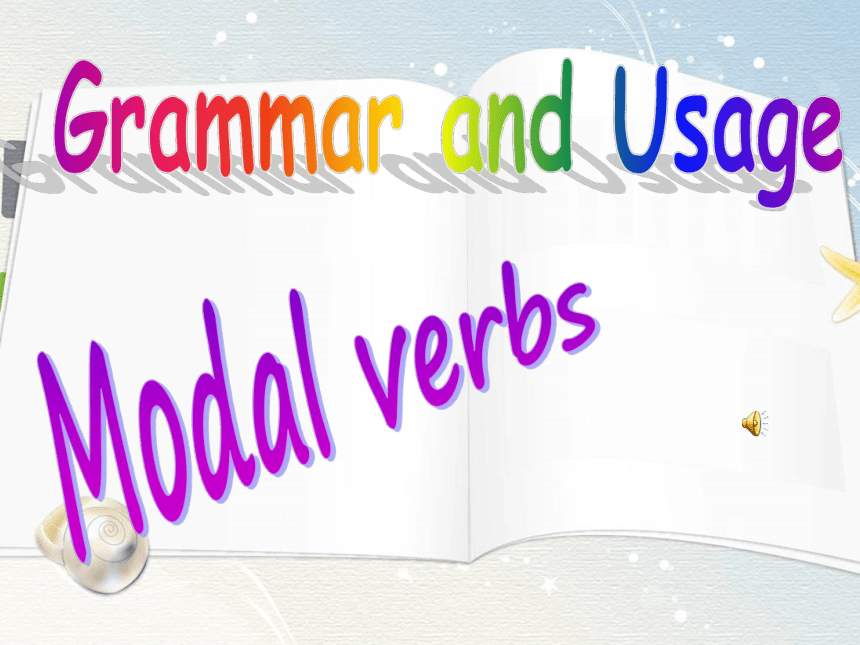 | |
| 格式 | zip | ||
| 文件大小 | 967.0KB | ||
| 资源类型 | 教案 | ||
| 版本资源 | 人教版(新课程标准) | ||
| 科目 | 英语 | ||
| 更新时间 | 2020-02-15 21:16:37 | ||
图片预览

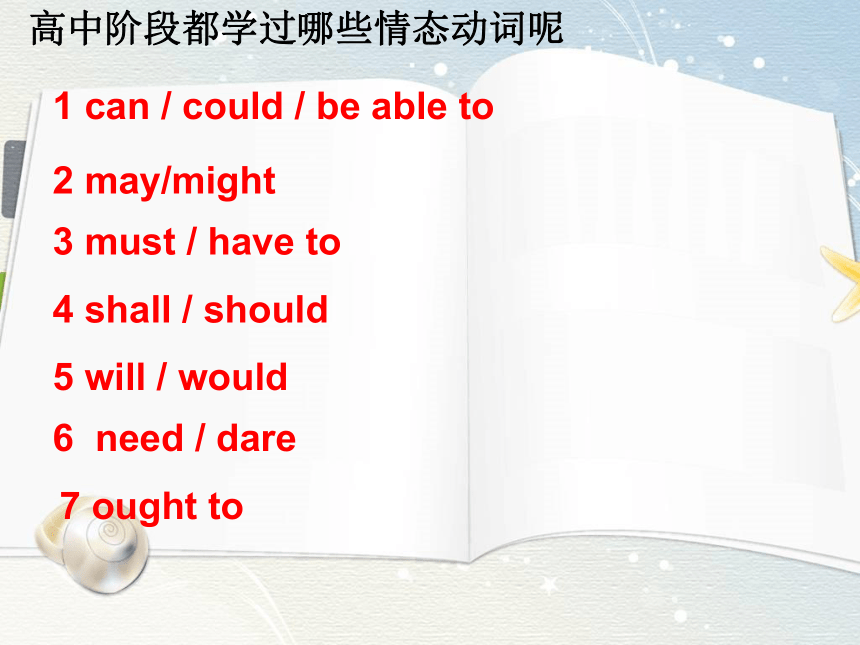
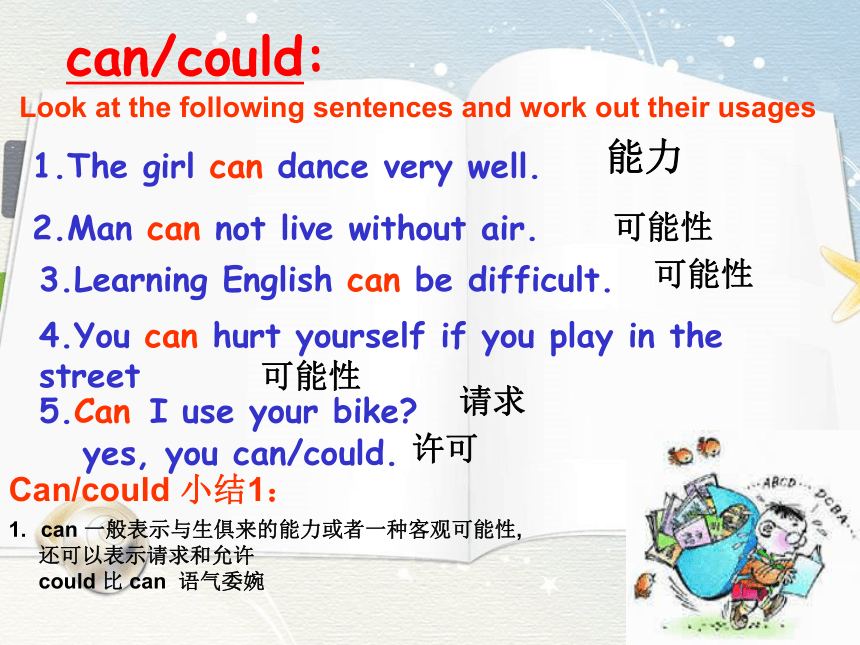
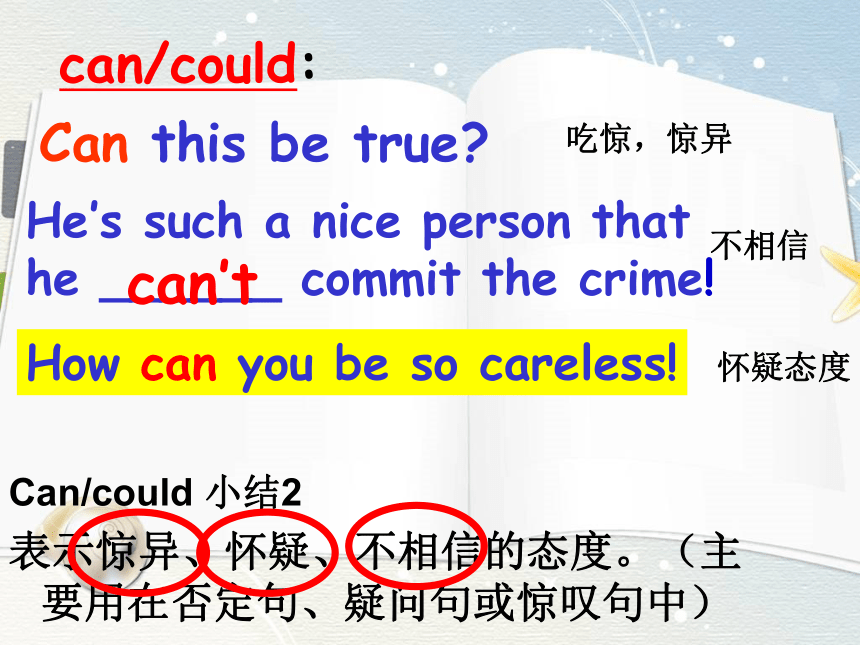
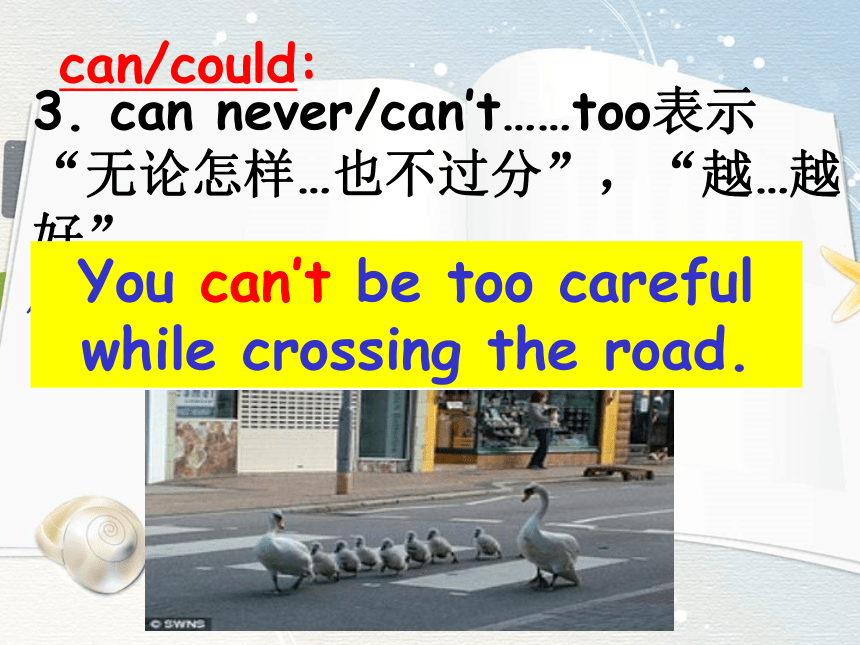
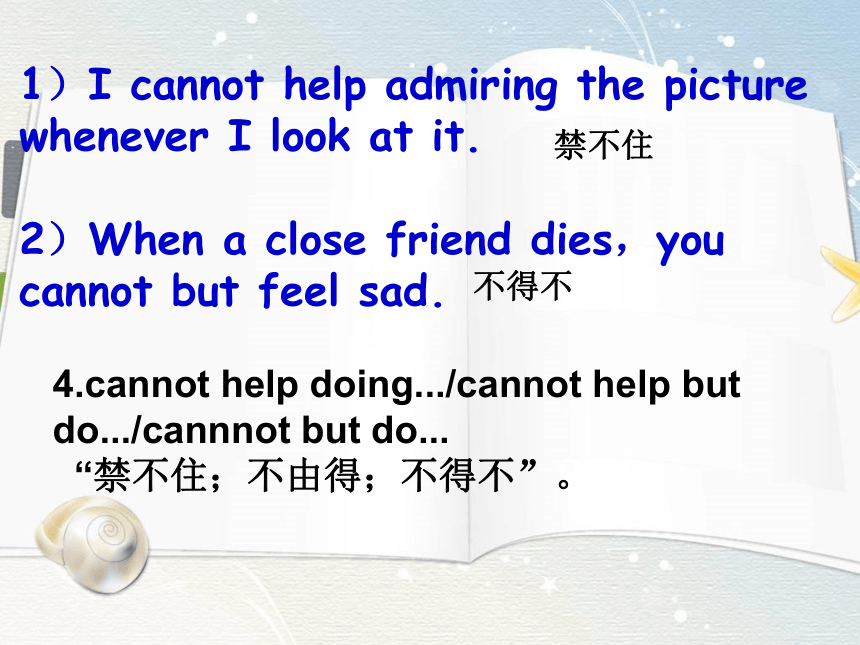
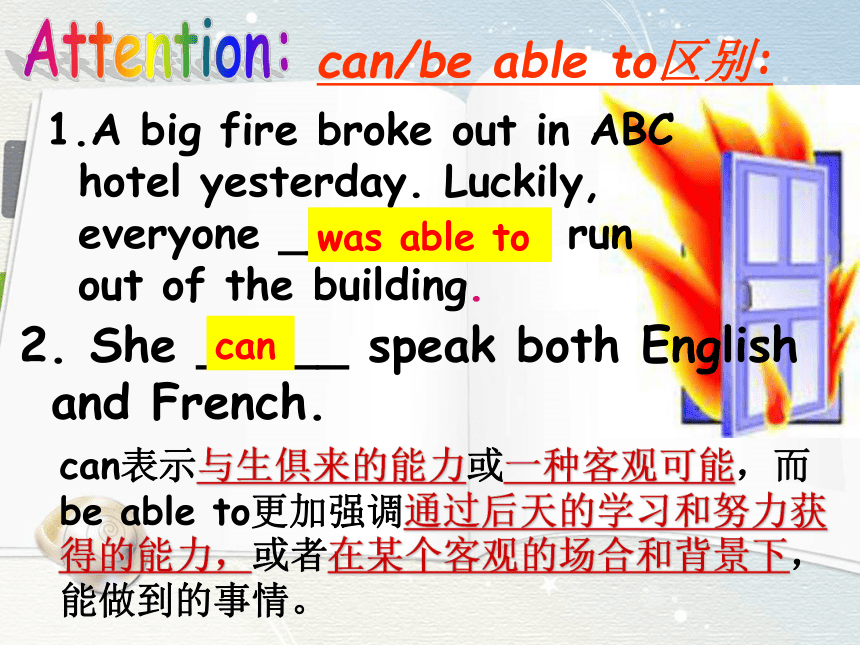
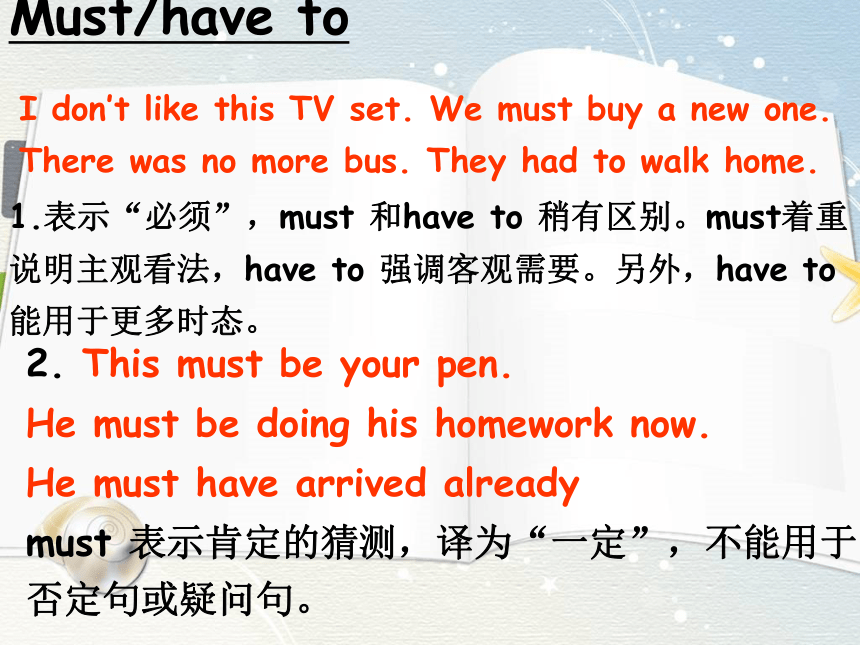
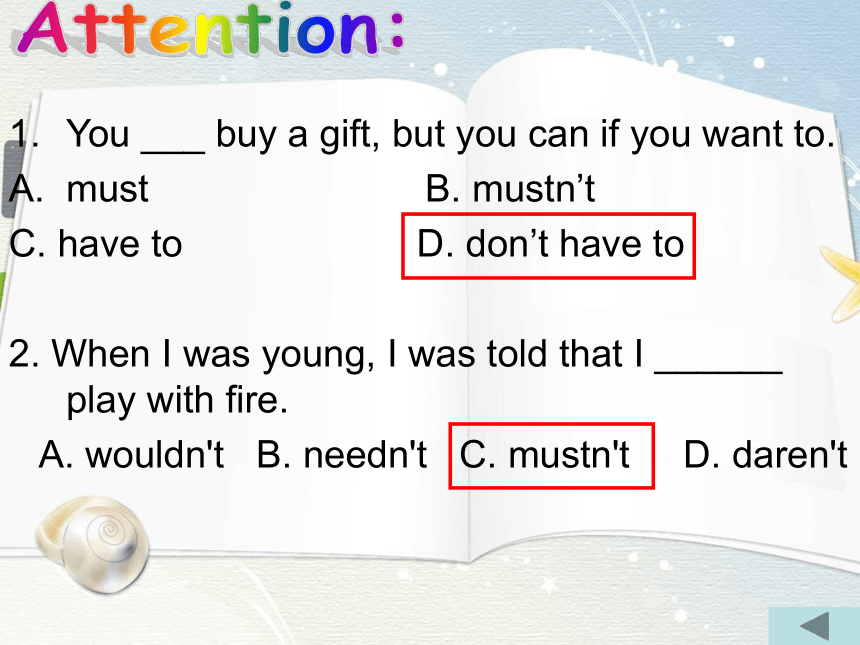
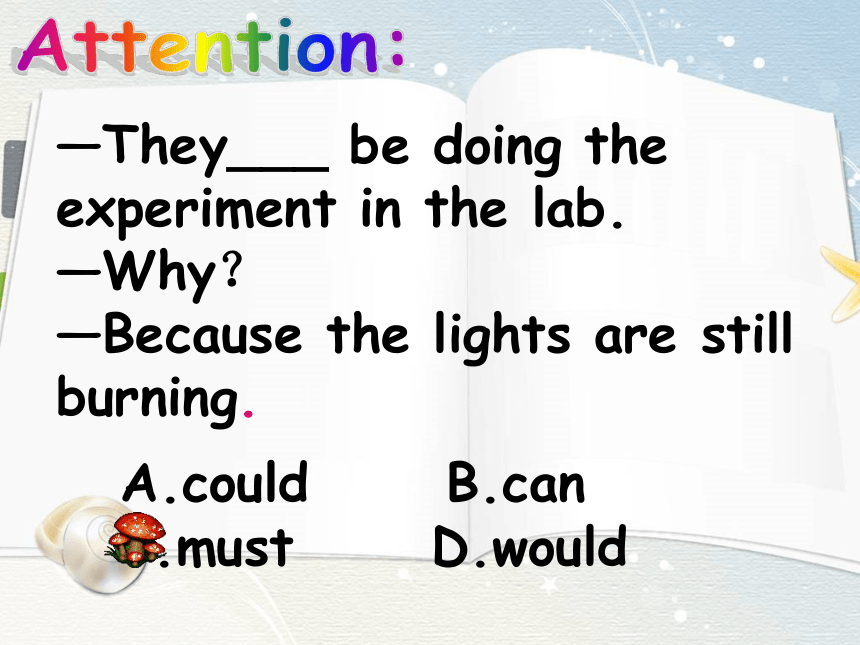
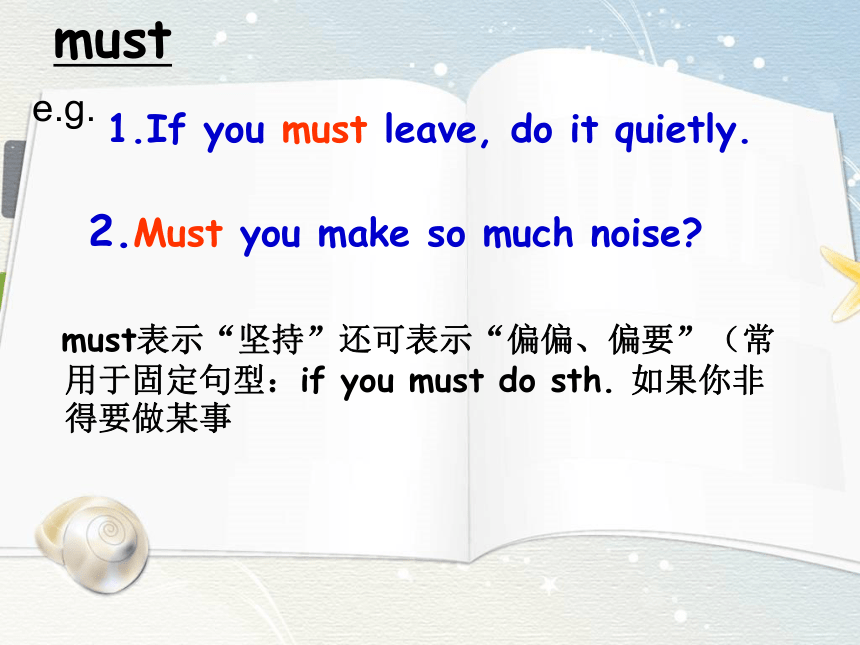
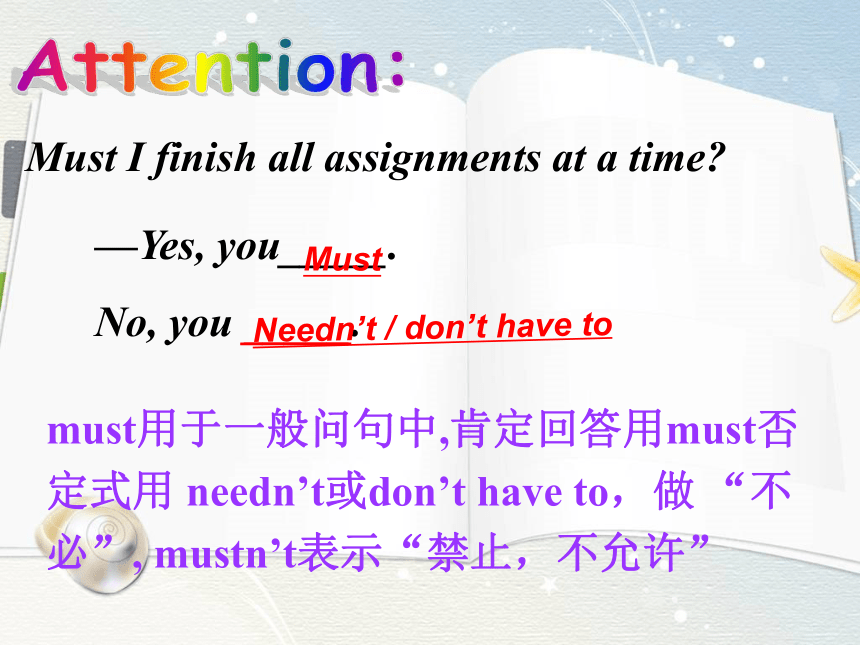
文档简介
(共50张PPT)
高中阶段都学过哪些情态动词呢
1 can / could / be able to
2 may/might
3 must / have to
4 shall / should
5 will / would
6 need / dare
7 ought to
can/could:
3.Learning English can be difficult.
2.Man can not live without air.
5.Can I use your bike?
yes, you can/could.
1.The girl can dance very well.
4.You can hurt yourself if you play in the street
can 一般表示与生俱来的能力或者一种客观可能性,
还可以表示请求和允许
could 比 can 语气委婉
Look at the following sentences and work out their usages
能力
可能性
可能性
可能性
请求
Can/could 小结1:
许可
can/could:
Can/could 小结2
表示惊异、怀疑、不相信的态度。(主要用在否定句、疑问句或惊叹句中)
He’s such a nice person that he ______ commit the crime!
can’t
How can you be so careless!
Can this be true?
吃惊,惊异
不相信
怀疑态度
can/could:
3. can never/can’t……too表示“无论怎样…也不过分”,“越…越好” 。
你过马路的时候再小心也不为过。
You can’t be too careful while crossing the road.
1)I cannot help admiring the picture whenever I look at it.
2)When a close friend dies,you
cannot but feel sad.
4.cannot help doing.../cannot help but do.../cannnot but do...
“禁不住;不由得;不得不”。
禁不住
不得不
can/be able to区别:
A big fire broke out in ABC hotel yesterday. Luckily, everyone __________ run out of the building.
was able to
2. She _____ speak both English and French.
can
can表示与生俱来的能力或一种客观可能,而be able to更加强调通过后天的学习和努力获得的能力,或者在某个客观的场合和背景下,能做到的事情。
2. This must be your pen.
He must be doing his homework now.
He must have arrived already
must 表示肯定的猜测,译为“一定”,不能用于否定句或疑问句。
.
Must/have to
1.表示“必须”,must?和have?to?稍有区别。must着重说明主观看法,have?to?强调客观需要。另外,have?to?能用于更多时态。
I don’t like this TV set. We must buy a new one. There was no more bus. They had to walk home.
You ___ buy a gift, but you can if you want to.
must B. mustn’t
C. have to D. don’t have to
2. When I was young, I was told that I ______ play with fire.
A. wouldn't B. needn't C. mustn't D. daren't
—They___ be doing the experiment in the lab.
—Why?
—Because the lights are still burning.
A.could B.can
C.must D.would
must
e.g.
2.Must you make so much noise?
must表示“坚持”还可表示“偏偏、偏要”(常用于固定句型:if you must do sth. 如果你非得要做某事
1.If you must leave, do it quietly.
must用于一般问句中,肯定回答用must否定式用?needn’t或don’t have to,做?“不必”, mustn’t表示“禁止,不允许”
Must?I?finish?all?assignments?at?a?time?
??—Yes, you_____.
No,?you?_____.
Must
Needn’t / don’t have to
may/might:
1. 表示许可。表示请求、允许时,might比may的语气更委婉一些。
— Might/May I use your computer?
— Yes, you can/may.
/No, you can’t/mustn’t.
may/might:
2.用于祈使句中表示祝愿。
3.表示推测、可能(只用于肯定句,疑问句则要用can或could)。
May you succeed.
He may be very busy now.
May you be happy all your life.
4. may well
e.g. Liza may well not want to go on the trip --- she hates traveling.
may well “极有可能”
e.g. You may as well stay for dinner.
may/ might as well “不妨”
shall:
1.Shall用于第一、第三人称疑问句中,表示说话人征求对方的意见、向对方请示或提供帮助 。
1.Shall we begin our lesson?
2.When shall he be allowed to leave hospital?
3.Shall I carry this bag for you?
shall:
2.Shall用于第二、第三人称,表示说话人给对方命令、警告、允诺或威胁。
You shall fail if you don‘t work harder.
He shall be punished according to the rule.
He shall have the book when I finish it.
警告
威胁
允诺
should:
1.Should表示劝告、建议、命令,其同义词是ought to;在疑问句中,通常用should代替ought…to。
Should I open the window?
我们应当要相互学习。
We should learn from each other.
should:
2.情态动词should用于第一人称时可以表示说话人的一种谦逊、客气、委婉的语气。
1)I should advise you not to do that again.
2)You are mistaken, I should say
1)I can’t believe such a gentleman should be so rude to the old.
2)It is strange that you should like him
3)I don’t know why you should think that I did it
3. should表示意外或惊讶 常译为
“居然,竟然”。
should:
should:
1.---When can I come for the photos ? I need them tomorrow afternoon.
---They _____be ready by 12 : 00 .
A. can B. should
C. might D. need
2. It’s nearly 7:00. Jack _____ be here at any moment. (N 95)
A. must B. need C. should D. can
4. should 表示猜测时,一般指按经验或逻辑判断,
翻译成“照说应该,估计,想必”
B
C
If she should know the truth,she would be greatly depressed.
Should you change your mind,let us know.
5.用于条件状语从句中)一旦;万一
will/would:
1. 表示请求、建议等,would比will委婉客气。
sentence
pattern
Would you please…
Would you mind…
Would you rather…
Would you like…
Would you mind if I opened the window?
will/would:
2.表示意志、愿望(意愿)和决心。
1)I will never do that again.
2)They said that they would help us
3)No matter what I said,he wouldn’t listen to me
will/would:
3.可表示经常性、习惯性、倾向性。翻译为“经常、惯于、总是”。用于否定句中,主语一般是事物,表示某事物暂时的特性)就是(不能)
1).The old man would have a smoke under a big tree every afternoon after he finished his farm work.
would 和 used to的比较
On Sundays he _______ go to call on the old man when he was young.
I _______ get up late, but now I have got used to getting up very early.
Xiao Li ________ be a model worker. He is now a university student.
1、would 主要表示过去一段时间内的某种习惯,常与表示过去的时间状语连用,意为“总要,总是”
used to 主要表示过去存在但是现在已不再存在的习惯,意为“过去常常”。
would
used to
used to
判断正误:
注意dare
How dare you say such a thing?
How dare you to say such a thing?
He daren’t to speak English before such a
crowd, did he?
He daren’t speak English before such a
crowd, dare he?
Nobody need to be afraid of catching the disease.
Nobody need be afraid of catching the disease.
These dishes need be cleaned carefully.
These dishes need to be cleaned carefully.
These dishes need cleaning carefully.
判断正误:
注意need
可兼做行为动词的情态动词:need 、 dare
情态动词 (+动词原形)
行为动词
.
need
dare
1.无人称和数的变化;
2.尤其用于:
*否定句及疑问句中;
*在if/whether之后;
*或与hardly, never,
no one, nobody连用;
3.常以needn’t 和daren’t
的形式出现;
4.dare有其过去时dared.
多用于肯定句;
(sb.) need to do
dare to do
(sth.) need to be
done
(sth.) need doing
can/may/must/need 问句的回答方式
疑问句式
肯定句式
否定答式
you may/can
mustn’t/may not.
you must
needn’t/don’t have to.
you must.
needn’t/don’t have to.
Can/Could you do sth. Yes, I/we/
can No, I/ we
can’t/ couldn’t
May I do sth.? Yes , No ,you
Must I /we do sth.? Yes, No you
Need I do sth.? Yes , No, you
1. The ground is rather wet, so it _______ have rained last night, didn’t it?
2. Tom __________have gone to Shanghai, but I’m still not sure about it.
3. The ground is very dry, so it _____ have rained last night.
4. Someone must have broken into our bedroom. Who ________ have done it?
5. I really regretted wasting the hours when I ______ have studied hard, but it was too late.
must
may/might
can’t
can/could
should
三. “情态动词+have done”的用法
6.Your home is not far from your school, so you _________ have left in such a hurry then.
7. I _____________ have come to help you with your English, but I was too busy at that time.
8. ---I paid a visit to New York last month and we stayed at a nice hotel.
---Oh,you _______have stayed with Barbara.She is always willing to do you a favour.
could
needn’t
would rather
1. - She looks very happy. She __ have passed the exam.
- I guess so. It’s not difficult after all.
A. should B. could
C. must D. might
2. She ___ have left school, for her bike is still here.
A. can’t B. wouldn’t
C. shouldn’t D. needn’t
3. - I’m sorry. I ___at you the other day.
- Forget it. I was a bit out of control myself.
A. shouldn’t shout
B. shouldn’t have shouted
C. mustn’t shout
D. mustn’t have shouted
4. You __ the exam, but you spent all your time playing.
A. can pass
B. could have passed
C. could pass
D. can have passed
5. - Catherine, I have cleaned the room for you.
- Thanks. You ____ it. I could manage it myself.
A. needn’t do B. needn’t have done
C. mustn’t do D. shouldn’t have done
6. My MP4 isn’t in my bag. Where_____I have put it?
A. can B. must C. should D. would
5.With so much work on hand, you ____to see the game last night.
A. mustn’t go B. could have gone
C. shouldn’t go D. shouldn’t have gone
6. There was plenty of time. She ____.
A. mustn’t have hurried B. couldn’t have hurried
C. must not hurry D. needn’t have hurried
7. –I saw Mary in the library yesterday. --You_____ her. She is still abroad. A. mustn’t see B. can’t have seen C. mustn’t have seen D. couldn’t see
8. Aunt Mary______the train, otherwise she would have arrived here by now. A. must have missed
B. should have missed C. had missed
D. might miss
三. “情态动词+have done”的用法
(1)must have done:对过去某事的有把握的推测(肯定句)
(2)can have done :对过去某事很有把握的推测(否定和疑问句)
(3)could have done:can have done 过去式
本来能够做的(有能力做)事实际却未做到
(4)may/might have done对过去某事的可能性猜测
might have done 还可表示本来应该或可以做某事,含轻微责备语气
(5)should/ought to have done过去应该做而未做
(6)shouldn’t/oughtn’t to have done
过去不应该做而实际上做了
(7)needn’t have done 本没有必要做的事实际却做了
didn’t need to do 表示没必要做的事实际也没做
(8)would rather have done:当时宁愿做某事却没做,后悔
5. 情态动词的应答
1. --- Shall I tell John about it?
--- No, you ______. I’ve told him already. (N 1994)
A. needn’t B. wouldn’t C. mustn’t D. shouldn’t
2. --- Could I call you by the first name?
--- Yes, you__________. (1998上海)
A. will B. could C. may D. might
A
C
此句的关键是“I’ve told him already”,由此可见,你就不必再对他说了。
在回答 “Could I …”这类婉客气的请求时,只能回答“Yes, you can 或 may”。不能用 could 或 might。
3. --- Will you stay for lunch?
--- Sorry, _____. My brother is coming to see me. (N 1999)
A. I mustn’t B. I can’t C. I needn’t D. I won’t
4. ---- Write to me when you get home.
---- __________. (2001北京春季)
A. I must B. I should C. I will D. I can
B
C
此句的关键是 “My brother is coming to see me.” 所以我不能在这儿吃饭。
在回答对方的请求或命令时,应该用 “Yes, I will.”而不能使用 would 或 should。
7. You ______ return the book now. You can
keep it till next week if you like.
A. can’t B. mustn’t C. needn’t D. may not
8. Johnny, you ______ play with the knife, you
______ hurt yourself.
A. won’t ; can’t B. mustn’t ; may
C. shouldn’t ; must D. can’t ; shouldn’t
C
B
9. --Will you stay for lunch?
--Sorry, _____. My brother is coming to see me.
A. I mustn’t B. I can’t
C. I needn’t D. I won’t
10. --May I pick a flower in the garden?
-- ________.
A. No, you needn’t B. Not, please.
C. No, you mustn’t D. No, you won’t
B
C
We use modal verbs to talk about:
1. Ability (能力)
2. Obligation (义务)
3. Certainty (可能性)
4. Permission (允许)
5. Make requests(提出请求)
6. Make suggestions(提出建议)
7. Make offers(提供帮助)
8. Give advice(提出意见)
情态动词的基本用法特点
1) 情态动词不能表示正在发生或已经发生的事
情,只表示期待或估计某事的发生。 2) 情态动词 除 ought 和 have 外,后面只能接不带
to 的不定式。 3) 情态动词没有人称,数的变化,即情态动词第
三人称单数不加-s。 4) 情态动词没有非谓语形式,即没有不定式,分
词,等形式。
只作情态动词的 can / could, may /
might, ought to, must
可情态可实义的 need, dare
可情态可助动词的 shall / should, will /
would
相当于情态动词的 have to, used to
Review the usage of modal verbs and finish the exercise paper
高中阶段都学过哪些情态动词呢
1 can / could / be able to
2 may/might
3 must / have to
4 shall / should
5 will / would
6 need / dare
7 ought to
can/could:
3.Learning English can be difficult.
2.Man can not live without air.
5.Can I use your bike?
yes, you can/could.
1.The girl can dance very well.
4.You can hurt yourself if you play in the street
can 一般表示与生俱来的能力或者一种客观可能性,
还可以表示请求和允许
could 比 can 语气委婉
Look at the following sentences and work out their usages
能力
可能性
可能性
可能性
请求
Can/could 小结1:
许可
can/could:
Can/could 小结2
表示惊异、怀疑、不相信的态度。(主要用在否定句、疑问句或惊叹句中)
He’s such a nice person that he ______ commit the crime!
can’t
How can you be so careless!
Can this be true?
吃惊,惊异
不相信
怀疑态度
can/could:
3. can never/can’t……too表示“无论怎样…也不过分”,“越…越好” 。
你过马路的时候再小心也不为过。
You can’t be too careful while crossing the road.
1)I cannot help admiring the picture whenever I look at it.
2)When a close friend dies,you
cannot but feel sad.
4.cannot help doing.../cannot help but do.../cannnot but do...
“禁不住;不由得;不得不”。
禁不住
不得不
can/be able to区别:
A big fire broke out in ABC hotel yesterday. Luckily, everyone __________ run out of the building.
was able to
2. She _____ speak both English and French.
can
can表示与生俱来的能力或一种客观可能,而be able to更加强调通过后天的学习和努力获得的能力,或者在某个客观的场合和背景下,能做到的事情。
2. This must be your pen.
He must be doing his homework now.
He must have arrived already
must 表示肯定的猜测,译为“一定”,不能用于否定句或疑问句。
.
Must/have to
1.表示“必须”,must?和have?to?稍有区别。must着重说明主观看法,have?to?强调客观需要。另外,have?to?能用于更多时态。
I don’t like this TV set. We must buy a new one. There was no more bus. They had to walk home.
You ___ buy a gift, but you can if you want to.
must B. mustn’t
C. have to D. don’t have to
2. When I was young, I was told that I ______ play with fire.
A. wouldn't B. needn't C. mustn't D. daren't
—They___ be doing the experiment in the lab.
—Why?
—Because the lights are still burning.
A.could B.can
C.must D.would
must
e.g.
2.Must you make so much noise?
must表示“坚持”还可表示“偏偏、偏要”(常用于固定句型:if you must do sth. 如果你非得要做某事
1.If you must leave, do it quietly.
must用于一般问句中,肯定回答用must否定式用?needn’t或don’t have to,做?“不必”, mustn’t表示“禁止,不允许”
Must?I?finish?all?assignments?at?a?time?
??—Yes, you_____.
No,?you?_____.
Must
Needn’t / don’t have to
may/might:
1. 表示许可。表示请求、允许时,might比may的语气更委婉一些。
— Might/May I use your computer?
— Yes, you can/may.
/No, you can’t/mustn’t.
may/might:
2.用于祈使句中表示祝愿。
3.表示推测、可能(只用于肯定句,疑问句则要用can或could)。
May you succeed.
He may be very busy now.
May you be happy all your life.
4. may well
e.g. Liza may well not want to go on the trip --- she hates traveling.
may well “极有可能”
e.g. You may as well stay for dinner.
may/ might as well “不妨”
shall:
1.Shall用于第一、第三人称疑问句中,表示说话人征求对方的意见、向对方请示或提供帮助 。
1.Shall we begin our lesson?
2.When shall he be allowed to leave hospital?
3.Shall I carry this bag for you?
shall:
2.Shall用于第二、第三人称,表示说话人给对方命令、警告、允诺或威胁。
You shall fail if you don‘t work harder.
He shall be punished according to the rule.
He shall have the book when I finish it.
警告
威胁
允诺
should:
1.Should表示劝告、建议、命令,其同义词是ought to;在疑问句中,通常用should代替ought…to。
Should I open the window?
我们应当要相互学习。
We should learn from each other.
should:
2.情态动词should用于第一人称时可以表示说话人的一种谦逊、客气、委婉的语气。
1)I should advise you not to do that again.
2)You are mistaken, I should say
1)I can’t believe such a gentleman should be so rude to the old.
2)It is strange that you should like him
3)I don’t know why you should think that I did it
3. should表示意外或惊讶 常译为
“居然,竟然”。
should:
should:
1.---When can I come for the photos ? I need them tomorrow afternoon.
---They _____be ready by 12 : 00 .
A. can B. should
C. might D. need
2. It’s nearly 7:00. Jack _____ be here at any moment. (N 95)
A. must B. need C. should D. can
4. should 表示猜测时,一般指按经验或逻辑判断,
翻译成“照说应该,估计,想必”
B
C
If she should know the truth,she would be greatly depressed.
Should you change your mind,let us know.
5.用于条件状语从句中)一旦;万一
will/would:
1. 表示请求、建议等,would比will委婉客气。
sentence
pattern
Would you please…
Would you mind…
Would you rather…
Would you like…
Would you mind if I opened the window?
will/would:
2.表示意志、愿望(意愿)和决心。
1)I will never do that again.
2)They said that they would help us
3)No matter what I said,he wouldn’t listen to me
will/would:
3.可表示经常性、习惯性、倾向性。翻译为“经常、惯于、总是”。用于否定句中,主语一般是事物,表示某事物暂时的特性)就是(不能)
1).The old man would have a smoke under a big tree every afternoon after he finished his farm work.
would 和 used to的比较
On Sundays he _______ go to call on the old man when he was young.
I _______ get up late, but now I have got used to getting up very early.
Xiao Li ________ be a model worker. He is now a university student.
1、would 主要表示过去一段时间内的某种习惯,常与表示过去的时间状语连用,意为“总要,总是”
used to 主要表示过去存在但是现在已不再存在的习惯,意为“过去常常”。
would
used to
used to
判断正误:
注意dare
How dare you say such a thing?
How dare you to say such a thing?
He daren’t to speak English before such a
crowd, did he?
He daren’t speak English before such a
crowd, dare he?
Nobody need to be afraid of catching the disease.
Nobody need be afraid of catching the disease.
These dishes need be cleaned carefully.
These dishes need to be cleaned carefully.
These dishes need cleaning carefully.
判断正误:
注意need
可兼做行为动词的情态动词:need 、 dare
情态动词 (+动词原形)
行为动词
.
need
dare
1.无人称和数的变化;
2.尤其用于:
*否定句及疑问句中;
*在if/whether之后;
*或与hardly, never,
no one, nobody连用;
3.常以needn’t 和daren’t
的形式出现;
4.dare有其过去时dared.
多用于肯定句;
(sb.) need to do
dare to do
(sth.) need to be
done
(sth.) need doing
can/may/must/need 问句的回答方式
疑问句式
肯定句式
否定答式
you may/can
mustn’t/may not.
you must
needn’t/don’t have to.
you must.
needn’t/don’t have to.
Can/Could you do sth. Yes, I/we/
can No, I/ we
can’t/ couldn’t
May I do sth.? Yes , No ,you
Must I /we do sth.? Yes, No you
Need I do sth.? Yes , No, you
1. The ground is rather wet, so it _______ have rained last night, didn’t it?
2. Tom __________have gone to Shanghai, but I’m still not sure about it.
3. The ground is very dry, so it _____ have rained last night.
4. Someone must have broken into our bedroom. Who ________ have done it?
5. I really regretted wasting the hours when I ______ have studied hard, but it was too late.
must
may/might
can’t
can/could
should
三. “情态动词+have done”的用法
6.Your home is not far from your school, so you _________ have left in such a hurry then.
7. I _____________ have come to help you with your English, but I was too busy at that time.
8. ---I paid a visit to New York last month and we stayed at a nice hotel.
---Oh,you _______have stayed with Barbara.She is always willing to do you a favour.
could
needn’t
would rather
1. - She looks very happy. She __ have passed the exam.
- I guess so. It’s not difficult after all.
A. should B. could
C. must D. might
2. She ___ have left school, for her bike is still here.
A. can’t B. wouldn’t
C. shouldn’t D. needn’t
3. - I’m sorry. I ___at you the other day.
- Forget it. I was a bit out of control myself.
A. shouldn’t shout
B. shouldn’t have shouted
C. mustn’t shout
D. mustn’t have shouted
4. You __ the exam, but you spent all your time playing.
A. can pass
B. could have passed
C. could pass
D. can have passed
5. - Catherine, I have cleaned the room for you.
- Thanks. You ____ it. I could manage it myself.
A. needn’t do B. needn’t have done
C. mustn’t do D. shouldn’t have done
6. My MP4 isn’t in my bag. Where_____I have put it?
A. can B. must C. should D. would
5.With so much work on hand, you ____to see the game last night.
A. mustn’t go B. could have gone
C. shouldn’t go D. shouldn’t have gone
6. There was plenty of time. She ____.
A. mustn’t have hurried B. couldn’t have hurried
C. must not hurry D. needn’t have hurried
7. –I saw Mary in the library yesterday. --You_____ her. She is still abroad. A. mustn’t see B. can’t have seen C. mustn’t have seen D. couldn’t see
8. Aunt Mary______the train, otherwise she would have arrived here by now. A. must have missed
B. should have missed C. had missed
D. might miss
三. “情态动词+have done”的用法
(1)must have done:对过去某事的有把握的推测(肯定句)
(2)can have done :对过去某事很有把握的推测(否定和疑问句)
(3)could have done:can have done 过去式
本来能够做的(有能力做)事实际却未做到
(4)may/might have done对过去某事的可能性猜测
might have done 还可表示本来应该或可以做某事,含轻微责备语气
(5)should/ought to have done过去应该做而未做
(6)shouldn’t/oughtn’t to have done
过去不应该做而实际上做了
(7)needn’t have done 本没有必要做的事实际却做了
didn’t need to do 表示没必要做的事实际也没做
(8)would rather have done:当时宁愿做某事却没做,后悔
5. 情态动词的应答
1. --- Shall I tell John about it?
--- No, you ______. I’ve told him already. (N 1994)
A. needn’t B. wouldn’t C. mustn’t D. shouldn’t
2. --- Could I call you by the first name?
--- Yes, you__________. (1998上海)
A. will B. could C. may D. might
A
C
此句的关键是“I’ve told him already”,由此可见,你就不必再对他说了。
在回答 “Could I …”这类婉客气的请求时,只能回答“Yes, you can 或 may”。不能用 could 或 might。
3. --- Will you stay for lunch?
--- Sorry, _____. My brother is coming to see me. (N 1999)
A. I mustn’t B. I can’t C. I needn’t D. I won’t
4. ---- Write to me when you get home.
---- __________. (2001北京春季)
A. I must B. I should C. I will D. I can
B
C
此句的关键是 “My brother is coming to see me.” 所以我不能在这儿吃饭。
在回答对方的请求或命令时,应该用 “Yes, I will.”而不能使用 would 或 should。
7. You ______ return the book now. You can
keep it till next week if you like.
A. can’t B. mustn’t C. needn’t D. may not
8. Johnny, you ______ play with the knife, you
______ hurt yourself.
A. won’t ; can’t B. mustn’t ; may
C. shouldn’t ; must D. can’t ; shouldn’t
C
B
9. --Will you stay for lunch?
--Sorry, _____. My brother is coming to see me.
A. I mustn’t B. I can’t
C. I needn’t D. I won’t
10. --May I pick a flower in the garden?
-- ________.
A. No, you needn’t B. Not, please.
C. No, you mustn’t D. No, you won’t
B
C
We use modal verbs to talk about:
1. Ability (能力)
2. Obligation (义务)
3. Certainty (可能性)
4. Permission (允许)
5. Make requests(提出请求)
6. Make suggestions(提出建议)
7. Make offers(提供帮助)
8. Give advice(提出意见)
情态动词的基本用法特点
1) 情态动词不能表示正在发生或已经发生的事
情,只表示期待或估计某事的发生。 2) 情态动词 除 ought 和 have 外,后面只能接不带
to 的不定式。 3) 情态动词没有人称,数的变化,即情态动词第
三人称单数不加-s。 4) 情态动词没有非谓语形式,即没有不定式,分
词,等形式。
只作情态动词的 can / could, may /
might, ought to, must
可情态可实义的 need, dare
可情态可助动词的 shall / should, will /
would
相当于情态动词的 have to, used to
Review the usage of modal verbs and finish the exercise paper
同课章节目录
